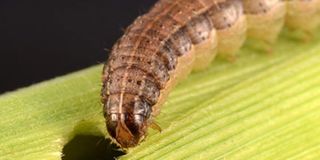Major cash crops under threat from deadly pest

The invasion of the Fall Armyworm (FAW) on some key cash and food crops could cripple agriculture, an economic sector that supports the livelihood of the biggest segment of Uganda’s population.
What you need to know:
- With nearly 100 hosts, the ASARECA report notes that the pest inflicts most damage to the staple cereal crops such as maize, wheat, sorghum, millet and rice and oat.
- Non-cereal crops such as cotton, soybean, beans, peanut, potato, sweet potato, spinach, tomato, sweet peppers, cabbage and tobacco are also not safe from the devastation of FAW.
Kampala. The invasion of the Fall Armyworm (FAW) on some key cash and food crops could cripple agriculture, an economic sector that supports the livelihood of the biggest segment of Uganda’s population.
Speaking last week at the Regional Workshop for Developing Strategies against Fall Army Worm in Eastern and Central Africa, the Association for Strengthening Agricultural Research in Eastern and Central Africa (ASARECA) Interim Executive Secretary, Dr Cypran Ebong, said no crop is safe from the pest.
He said: “FAW is spreading really quickly and its implication is far reaching. There is no crop that is safe so this regional workshop should find a solution to this pandemic that is already with us here.”
In a separate interview, Dr Ebong said to contain the devastation of the pest, regional countries, among them Uganda, should be willing to commit resources in this endeavour as well as demonstrate political will and leadership to eradicate it before it becomes a menace.
Counting losses
According to data provided by ASARECA, the FAW is believed to have originated from the Americas with cereal crops such as maize being its preferred host. The pest also has potential to cause losses of up to 70 per cent.
Brazil alone spends $600m annually on managing the pest according to Food and Agriculture Organisation.
In Africa, the FAW was first reported in Nigeria in January 2016.
Its recent invasions were reported in Benin, Kenya, Togo, Sao Tome, South Africa, Zambia, Uganda, Zimbabwe and Europe.
The pest is carried across borders on exported plant material, but the adult moths can also cross freely given their excellent flying ability.
As mitigation, farmers must plant early to mitigate the effect of FAW.
Yield loss for Uganda alone is estimated at between 560,000 to 1.3 million tones which translate to between $164m to $400m.
With nearly 100 hosts, the ASARECA report notes that the pest inflicts most damage to the staple cereal crops such as maize, wheat, sorghum, millet and rice and oat.
Non-cereal crops such as cotton, soybean, beans, peanut, potato, sweet potato, spinach, tomato, sweet peppers, cabbage and tobacco are also not safe from the devastation of FAW.




